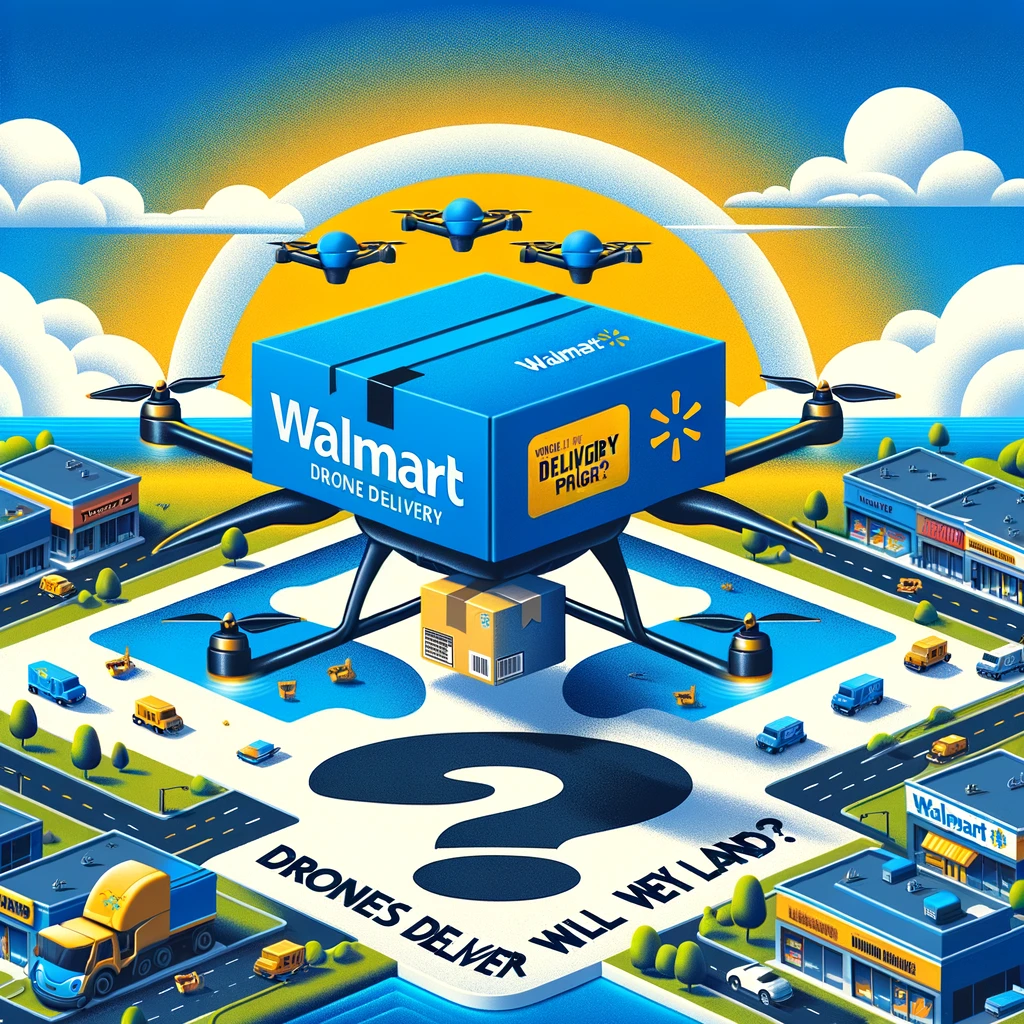Soon, drone delivery will not be a luxury but a baseline expectation; Walmart's drone delivery program in Texas is an evolution of retail logistics.
Walmart announced the expansion of its drone delivery program at this year’s CES (Consumer Electronics Show). But as we navigate this new territory, questions about regulations, consumer acceptance, and the competitive landscape arise. Will these high-flying ambitions soar, or will they face turbulence?
Walmart's Drone Delivery Program: 10 minutes into the future
Walmart's ambitious drone delivery program aims to serve 1.8 million additional households in the Dallas-Fort Worth area, encompassing over 30 towns and municipalities. This expansion, powered by providers like Wing and Zipline, marks a step in retail innovation, offering deliveries in as little as 10 minutes.
Image that single parent with little ones during cold and flu season. Through this program, Walmart is not deploying technical novelties but road traffic and optimizing costs while enabling new jobs. In the last two years, Walmart has had over 20,000 deliveries on record.
Envision fleets of drones darkening the skies periodically during the day, reducing road traffic (and rage) with precision deliveries.
Navigating the Skies: Get thee a license.
Texas operates under the Federal Aviation Administration's (FAA) Part 107 rules like other states. 107 requires commercial drone pilots to pass the FAA’s Aeronautical Knowledge Test for a Remote Pilot Certificate. Additional state laws are in place to protect privacy and safety, including restrictions on flying over populated areas, near airports, and at night. The Texas Legislature has also created specific laws governing the use of drones, emphasizing safety and privacy.
Walmart’s influence on regulatory bodies has always been significant. In 2022, company employees donated $1.89M to candidates across the board. The retail giant's collaboration with the FAA and other regulatory bodies ensures adherence to safety standards and fosters a conducive environment for drone operations. Walmart’s approach and safety record could set a precedent for future drone operations in the retail sector.
But what does the consumer say?
Initial consumer response to Walmart's drone delivery in Texas has been positive, with customers using the service to deliver items like snacks and over-the-counter medicine quickly.
However, the broader consumer sentiment is still forming. Most consumers form their opinions based on their knowledge/speculation of drone hobbyists and military uses. The convenience of rapid delivery is balanced against concerns over privacy, safety, and the environmental impact of these crewless flights. In surveys conducted by Virginia Tech, consumers had an 87% favorable rating. There is a good
write-up here. There is intense speculation, with some consumer saying they would pay for their secured landing pads while others say free delivery is a must. Some speculate that drone delivery is the new convenience store.
Sky-High Potential
Drone delivery opens up significant revenue growth opportunities for Walmart. By cutting down delivery times and costs, Walmart can increase customer satisfaction and loyalty, potentially boosting sales. It trades one type of job for another. “Flight crews” and packers/expediters replace in-store cashiers and greeters, potentially expanding the work-from-home workforce.
The data gathered from these operations could provide invaluable insights into consumer behavior and the trade-off of physical stores versus retail air bases, further refining Walmart's business strategy.
Look to the Skies: A Look at the Rivals.
As Walmart pioneers, other retail giants are just a step behind.
Companies like Amazon and UPS are also experimenting with drone delivery. The competition in this new frontier will likely intensify as technology evolves and regulations become more accommodating. The race is on to see who can most effectively integrate this technology into their business model while maintaining safety and public trust.
Drone programs have been in the works for several years. In 2020, I proposed a drone-based food delivery program for my company. People laughed and told me not to share it with our customers. Two months later, a local company hired one of my Product Managers to run their drone program. I’m looking at you, Andy Jassy…
Call to Action: The Future is Here
Walmart's drone delivery program in Texas is not just about delivering goods but evolving consumer connections. Key takeaways:
- Consumer sentiment and buy-in are essential.
- Securing local political and regulatory support is critical.
- How much trade-off or channel growth will Walmart and others be able to achieve?
- Are drone delivery services genuinely scalable?
- Will you have ethical concerns?
In conclusion, while the drones are set to deliver, the question remains: will they land smoothly in the complex landscape of consumer needs, regulatory frameworks, and competitive pressures?
Are drones and other automated delivery in your strategic planning discussions? What open items is your leadership discussing?

